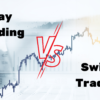

You may have heard of prop trading before. It’s a type of trading where you’re funded by a prop firm in order to trade on their behalf. In return, you share the profits from your trades. But what if you could trade on your behalf without worrying about finding a prop firm?
Prop trading is an option that more and more people are starting to consider. In this article, we’ll take a look at the pros and cons of each method and help you decide which is right for you.
What is prop trading?

Prop trading is a form of trading in which a trader gets money from a brokerage firm to trade. In other words, the trader does not use their own money to trade; they borrow money from the firm.
There are a couple of benefits to prop trading. First, it allows traders to trade with more money(leverage), which means they can take on more significant positions and make more profit. Second, it provides traders with access to better trade information and research.
But there are also some drawbacks. First of all, if you have a deposit that is not insured, your money is at risk. But stakes are usually insured by the broker anyway, so this isn’t a problem.
Second, proprietary trading has fees. In most cases, these fees will be much lower than what you’d pay if you were doing your own trading.
Finally, some people don’t like the idea of not being in control of their trades! Some firms only allow day trading and frown upon holding overnight positions. However, don’t worry because there are so many different kinds of proprietary trading firms out there these days—to meet everyone’s needs!
What is self-funded trading?

Self-funded trading is when you’re funding your trading account with your own money. This contrasts prop trading, where you’re using someone else’s money to trade.
With self-funding, you’re in complete control of your money and can make as much or as little as you want. But you also have the added pressure of knowing that it’s your own money on the line.
Prop trading can be a great way to get started in the markets since you don’t have to put up as much money. But it’s also riskier since you’re relying on someone else’s money, and you have to abide by their trading rules and regulations.
The advantages and disadvantages of prop trading vs self-funded trading

Prop trading is a great way to make a living as a trader. You get to trade with someone else’s money, which gives you the opportunity to make a lot of money in a short period of time.
But there are some risks associated with prop trading. First, you’re relying on someone else to give you money so that you can trade. And if that person decides to pull the plug, you’re out of a job.
Second, prop trading can be addictive. It’s easy to get caught up in the excitement of making money and start taking bigger and bigger risks. Before you know it, you’ve lost all your money, and are out of a job.
That’s why self-funded trading is such a great alternative. You’re in control of your own money, which means you can’t lose it all in one go. And if you do lose money, it’s your own fault, which can be a great learning experience.
The main disadvantage to self-funded trading is the lack of a plan. Many people who start trading are excited, but they don’t have a plan or risk model in place before they start trading. They end up blowing out their own accounts and then realize that they need help.
Which is better for you?

So, you’re thinking about becoming a trader. Great! But before you dive in, you need to ask yourself one question: are you going to trade using your own money (self-funded trading), or are you going to use someone else’s money (prop trading)?
Both have pros and cons, so let’s look at each option in more detail. With self-funded trading, you’re in complete control. You make all the decisions and are responsible for your losses and profits. But this also means that you’re on the hook for all the risk.
Prop trading is an excellent option if you’re looking for less risk. You’re still in control of your trades, but you’re not risking as much money. On the downside, you don’t make as much money as you would if you were self-funded because of profit-split with the firm.
So, which is right for you? Only you can answer that question. But it’s essential to weigh all the pros and cons before deciding.
How to get started in prop trading or self-funded trading

You’re probably wondering how you can get started in prop trading or self-funded trading. It’s not as difficult as you might think.
First, you need to decide which route you want to take. Prop trading is when you trade with the help of a broker or firm, while self-funded trading is when you finance your trades.
Then, you need to open an account with a broker or firm. This is where you’ll deposit your money and start trading. There are a lot of different brokers and firms to choose from, so do your research and find one that’s right for you.
Finally, it’s time to learn as much as you can about trading. There are many resources, including online courses, blogs, and even podcasts. Start listening and learning; before you know it, you’ll be on your way to becoming a successful trader.
Conclusion
There are pros and cons to both prop trading and self-funded trading. With prop trading, you have the backing and resources of a broker or firm, which can give you a leg up in the markets.
However, with self-funded trading, you have more freedom and control over your portfolio, which can be both a burden and a blessing.
Ultimately, it’s up to you to decide what’s right for you. Do your research, weigh the pros and cons, and decide what’s best for your situation.
If you enjoyed this article, then check out Is prop trading a good career?









